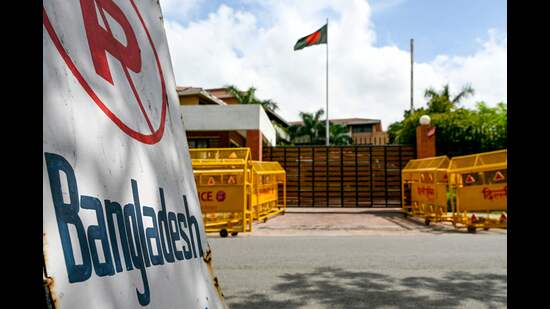Aug 06, 2024 08:43 PM IST
India faces daunting challenges post Sheikh Hasina’s ouster in maintaining friendly relations with Bangladesh and countering Chinese influence in the region.
The challenges for India from Sheikh Hasina’s ouster are daunting. Under her, Bangladesh was the friendliest it has been to India after the initial years of its Independence in 1971, not just by refusing to shelter insurgents from India’s Northeast but also by being mindful of India’s concerns in engaging with nations hostile to the latter. As a corollary of this trust nurtured by Dhaka, New Delhi deepened trade and investment ties. Now, the political vacuum in Dhaka should worry India on security, given the infamous porosity of the 4,100-kilometre long border between the countries, apart from trade.

Bangladesh’s centrality to the Neighbourhood First aspect of India’s foreign policy makes the developments in the country even more worrying from New Delhi’s perspective. India’s push for regional energy and transport connectivity is also an attempt to contain Chinese influence in Bangladesh, Nepal and Bhutan. A growing Bangladesh needed Nepal and Bhutan to provide both markets for its products and power for its industry, and India was happy to play facilitator through its grid, road and railway networks. A number of agreements had been arrived at, with India hoping to draw these nations together in an economic embrace, away from China’s overtures. All that is now at risk.
While Hasina’s ouster may have been precipitated by the student protests and the brutal crackdown that followed, it has rejuvenated parties such as the Bangladesh National Party (BNP), the main opposition party, the Jamaat-e-Islami, and other hardline Islamist outfits. The Bangladeshi military, which is in charge till a caretaker government is formed, ordered the release of BNP supremo Khaleda Zia. When in power, the BNP and its allies were less than lukewarm on developing a mutually beneficial relationship with India. They vociferously opposed almost all agreements with India under the Hasina regime, and the perception was that they were more receptive of China’s attempts to woo their country. For India, this complicates the picture. It must support Bangladesh’s return to democracy at the earliest, but must also contend with the likelihood of less-friendly dispensations making a return in Dhaka given that the popular mood there is against Hasina’s Awami League.
Unlock a world of Benefits with HT! From insightful newsletters to real-time news alerts and a personalized news feed – it’s all here, just a click away! –Login Now!


